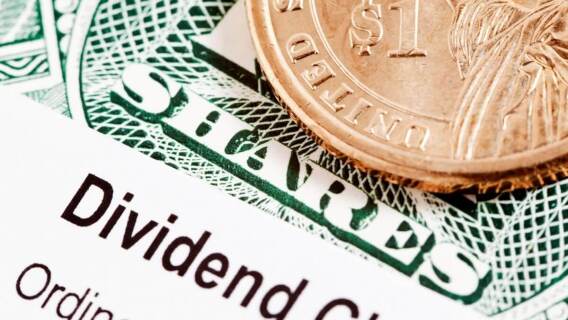Nearly all 30 stocks in the Dow Jones Industrial Average pay dividends, but not all of them are exceptionally high dividend yields. Fifteen of the 30 stocks in the Dow yield 2% or more, but because of the Dow’s selectivity, it can be a great place to turn for yield if you’re seeking Dividend Aristocrats (stocks that have raised their dividends at least 25 years in a row) or high-dividend, blue-chip stocks. With that in mind, what are the highest-paying dividend stocks in the Dow today?
The 10 Highest Paying Dividend Stocks in the Dow
1. Verizon (VZ)
2. Chevron (CVX)
3. UnitedHealth Group (UNH)
4. International Business Machines (IBM)
5. Merck (MRK)
6. Amgen (AMGN)
7. Coca-Cola (KO)
8. Procter & Gamble (PG)
9. Nike (NKE)
10. Home Depot (HD)
Like the index itself, the highest-paying dividend stocks in the Dow are well-established, high-quality American companies. Many are over 100 years old. For some of them, however, their best days are behind them. Some have very high dividend payout ratios that show they’re returning most of their cash to shareholders at this point—rather than reinvesting in their business.
Below, I take a closer look at each of the highest-paying dividend stocks in the Dow and separate the dogs from the dividend champs.
[text_ad]
1. Verizon (VZ)
Dividend Yield 5.7%
Telecoms typically pay high dividends, and the highest dividend yield in the Dow almost always belongs to Verizon. Verizon is one of the top four U.S. wireless carriers but faces stiff competition from AT&T (T) and T-Mobile (which just posted its best customer growth ever). All the telecoms have spent recent years lowering prices and sweetening plans to lure customers, which has resulted in good deals for consumers but has cut into corporate revenues and earnings. Verizon’s sales initially peaked in 2015, and it saw lower revenues in 2016-2017. But top-line growth swung higher in 2018, and after the 2020 debacle, the top line is once again in the ascendant.
For its part, Verizon is investing heavily in forward-looking ventures, including the “Internet of Things” and digital content. While economic uncertainty persists going forward, it should be kept in mind that VZ has a tendency to outperform other Dow 30 components in periods of economic weakness, thanks largely to its healthy subscription-based business. In the Great Recession of 2008-2009, for instance, VZ experienced a price drop of only 33% compared with a far more devastating 50% drop for the broad market.
2. Chevron (CVX)
Dividend Yield 3.8%
Chevron is one of the world’s largest oil companies, with energy exploration, production, refining, trading and transport operations that circle the globe. Founded in 1879, Chevron has paid dividends since 1970.
Like the rest of the energy sector, Chevron’s stock tanked in early 2020 but had fully recovered by 2022. Then, after being range-bound for the next three years, 2026 brought with it a major change in character, with shares up more than 20% this year alone.
Chevron has a steady record of dividend payments despite crises in the energy sector, most recently increasing its dividend 4% coming into 2026. Although the stock’s dividend payout ratio has popped over 100% several times, CVX is currently on the Dividend Aristocrats list.
The stock is choppy at times and has a tendency to surge and crash with oil prices. But should crude rally, CVX is a worthwhile choice for investors who want some exposure to the leaner and meaner energy sector.
3. UnitedHealth Group (UNH)
Dividend Yield 3.2%
UnitedHealth Group is America’s largest insurer and one of the world’s largest private health insurers. It’s a goliath with $447.6 billion in annual revenues that serves 148 million members in all 50 states and 33 countries.
The group provides services at just about every facet of the health care process under four different segments: UnitedHealthcare, Optum Health, Optum Insight, and Optum Rx.
It’s also a company that’s been upended by turmoil in the last few years, with the high-profile murder of a company CEO, backlash against insurers over claim denials, and, more recently, an investigation by the Department of Justice concerning its Medicare billing practices.
Those negative headlines are largely responsible for UNH’s inclusion on this list, as the yield has risen due to the share price shedding 40.5% in the last year and 17.3% in the last five.
As for the dividend, the company raised its most recent by 5% (in 2025), from $2.10 per share to $2.21, but given the tumult at the company, it’s likely small comfort to shareholders.
4. International Business Machines (IBM)
Dividend Yield 2.9%
IBM is a multinational technology company founded in 1911 and headquartered in Armonk, New York. It is one of the world’s oldest and largest IT companies.
IBM provides hardware, software, cloud computing, artificial intelligence (notably Watson), consulting services, and enterprise infrastructure solutions. It has historically been known for mainframe computers and has played a major role in the development of modern computing. Today, IBM focuses heavily on hybrid cloud, AI, quantum computing, and business technology services for large organizations and governments.
Although somewhat uncommon for a tech company, IBM has also been a reliable dividend payer for many years, with consecutive quarterly dividends dating back to 1916.
The relatively high placement on this list is owing to recent performance, as shares have fallen 12.5% in the last year, with the bulk of that decline coming this week on AI-related fears. But even with the recent weakness, shares have performed quite well, having risen 101.8% in the last five years alone.
5. Merck (MRK)
Dividend Yield 2.7%
Merck, originally founded as the American arm of the German Merck Group in 1891, is a global healthcare company that operates in two segments: Pharmaceutical and Animal Health.
The company has multiple drugs in production with “blockbuster” status (more than $1 billion in annual revenue), most notably Keytruda and Januvia, which are used in cancer immunotherapy and diabetes treatment, respectively.
The company has a strong track record of raising or maintaining its dividend over the last 25 years, most recently raising the dividend from $0.81 a share to $0.85 in December 2025.
As for the stock, MRK has risen 36.2% in the last year and is 79.5% over the last five, with more than half of those gains coming in the last three months alone as healthcare stocks have rotated back into favor.
6. Amgen (AMGN)
Dividend Yield 2.6%
Originally founded in 1980, Amgen is an American biopharmaceutical company that has expanded its presence to 100 countries worldwide. It specializes in cardiovascular disease, oncology, bone health, neuroscience, nephrology and inflammation and specifically targets diseases for which there are no or limited viable alternative treatments.
In the company’s fiscal 2025, revenues came in at a record-high $36.7 billion, rising 10% from the prior year’s total. Like most biopharmas, the company is constantly playing defense against generics, but Amgen’s robust pipeline offers it a sizeable moat.
As for the dividend, Amgen recently raised it to $2.52 from $2.38 per share quarterly. Couple the yield with Amgen’s longer-term performance (up 68.9% in the last five years with strong sector tailwinds) and its ability to weather the storm in the event of an economic downturn, and you get an attractive dividend stock.
7. Coca-Cola (KO)
Dividend Yield 2.6%
Coca-Cola, the ubiquitous beverage company that needs no introduction, is the largest non-alcoholic beverage company in the world with a portfolio of soft drinks, energy drinks, juices and beverages sold worldwide comprising over 200 individual brands. While the stock is something of a slow grower, its products are also resilient, which tends to help them hold up in times of trouble.
Analysts are projecting mid-single-digit growth for the next five years, although the company beat earnings expectations in its most recent quarter.
As for the dividend, Coca-Cola increased its quarterly dividend from $0.48.5 to $0.51 at the beginning of 2025 and then again to $0.53 at the beginning of this year. Coca-Cola has a history of raising dividends at the beginning of the year, so the minor hike should come as no surprise.
8. Procter & Gamble (PG)
Dividend Yield 2.6%
Procter & Gamble is an American multinational consumer goods company that’s been doing business since 1837 and has been a Dow Jones constituent since 1932.
The brand portfolio is a who’s who list of products that you can likely find all over your home. From Pampers, Charmin, and Bounty to Tide, Crest, and Gillette, if you use it every day, odds are good that it’s made by Procter & Gamble.
The company has been steadily raising its dividend for the last two decades and, most recently, paid a quarterly dividend of a hair above $1.05 per share.
As for the stock, it’s down 2.9% in the last year and up only 34.1% in the last five (which is underperforming the Dow itself, which is up 59.1% in the last five years).
9. Nike (NKE)
Dividend Yield 2.6%
Nike isn’t a name you’d typically associate with a high dividend yield, but a significant stretch of underperformance has pushed the dividend yield up substantially.
This formerly high-growth, high-profile sportswear company manufactures some of the most recognizable sneaker brands on the planet, including the Air Jordan brand of basketball shoes and offerings from wholly owned subsidiary Converse.
Nike currently offers a dividend yield of 2.6%, paying $0.41/share quarterly, which is up from $0.40/share this time last year. The company also boasts 24 consecutive years of dividend growth, putting it on the threshold of achieving Dividend Aristocrat status.
But the elephant in the room (and the reason it’s on this list) is the share price. NKE has fallen 52.5% in the last five years and is lower by 20.2% in the last year alone. In fact, shares are trading at the same level they were a decade ago, and with tariffs raising input prices and consumers feeling pinched, investors shouldn’t consider the stock for its dividend alone.
10. Home Depot (HD)
Yield 2.4%
The Home Depot is the world’s largest home improvement retailer. Founded in 1978, the company is headquartered in Atlanta, Georgia, and operates thousands of stores across the United States, Canada, and Mexico.
Home Depot sells a wide range of products, including building materials, tools and hardware, plumbing and electrical supplies, appliances, garden and outdoor products, paint and décor items, and more.
It serves DIY customers (homeowners completing their own projects) and professional contractors (“Pros”) who rely on bulk purchasing, job-site delivery, and specialized services (their appeal to Pros has been a consistent differentiator from peer Lowe’s (LOW)).
Beyond retail sales, Home Depot offers services such as tool rental, installation (e.g., flooring, roofing, HVAC), and online ordering with in-store pickup or delivery. The company has invested heavily in e-commerce and supply chain capabilities to integrate physical stores with digital sales.
The company’s fortunes tend to be tied to the strength of the housing market and consumers, so the stock has been in a bit of a rough patch, up only 0.3% in the last year and a modest (but respectable) 48.5% in the last five years.
As for the dividend, the company recently hiked the quarterly payout from $2.30 per share to $2.33, which takes effect with the upcoming dividend in March. It was a modest hike from the firm, but it does mark the company’s 156th consecutive quarterly dividend.
[author_ad]
*This post is periodically updated to reflect market conditions.

